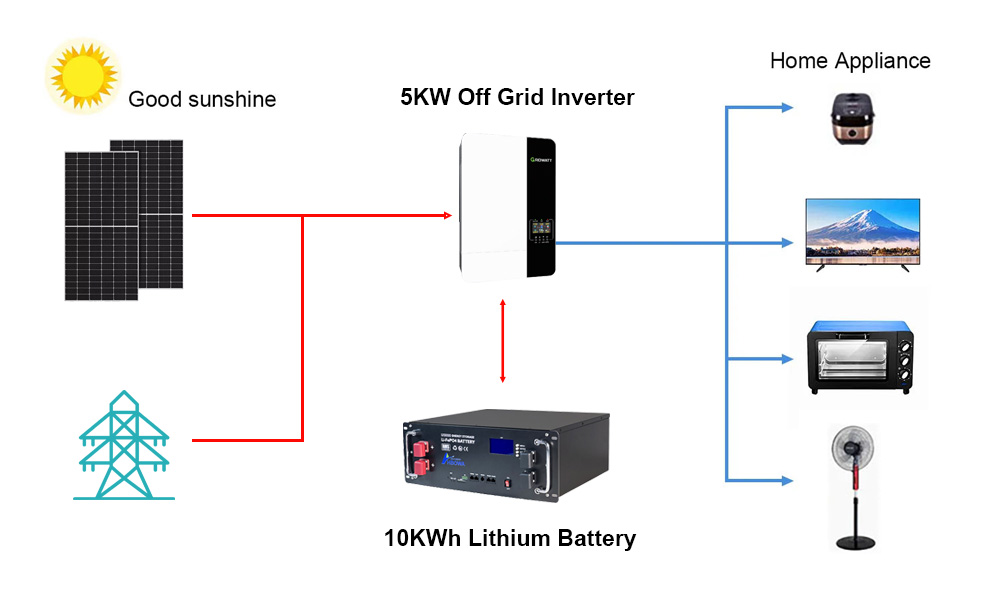A solar off grid power system, also known as a off grid photovoltaic power generation system, is a self-sufficient electricity solution that does not rely on the main grid. An off-grid solar system primarily utilizes solar panels to convert sunlight into electrical power, and supply this energy to load through a solar charge controller and solar inverter. Under sunlight conditions, the off grid solar PV system supplies power to the load via the solar panels while simultaneously charging the battery bank. During sunless days or at night, the solar system supplies power to the load through the battery bank.
What is off-grid Energy Storage System?
Off grid energy storage system power sources can be solar panels and wind turbines to generate electricity. The solar charge controller manages the electrical power, protecting the battery bank from overcharging and over-discharging. The battery bank stores the electrical energy for power backup use. The solar inverter converts direct current DC from the solar panels or the solar batteries to alternating current AC, allowing AC devices to be powered. Nowadays, many solar inverters integrate solar charge controllers, making the management and utilization of electrical energy more efficient and easy to install. Off-grid energy storage systems are more suitable for remote areas where the utility grid is unavailable or places with unstable grid sources.

Components of Off-Grid Energy Storage System
An off grid solar power system primarily consists of solar panels, a solar battery bank, a solar charge controller, and a solar inverter. As the technology goes on, the solar inverter integrates itself and the solar charge controller into one unit. Now let’s see them in detail:
Solar Panels:
There are many types of solar panels according to their materials and manufacturing processes, such as PERC solar panels, N-Type TOPCon solar panels, all black solar panels, mono-facial solar panels, and bifacial solar modules, they all act as power sources in the off grid energy storage to absorb the power from the sunlight and generate DC electricity energy.
Solar Inverters:
The off grid solar inverters function as the converter, they convert the DC electricity from the power sources into AC electricity for residential, commercial, and industrial uses. Off grid solar inverters have many types according to the voltage, and AC output, such as 5KW single-phase off grid solar inverters (AC Output: 220V, 50/60Hz), and 6KW split-phase off grid solar inverters(AC Output: 110V, 50/60Hz) to meet the power supply requirements from all around the world.
Solar Batteries:
There are many types of solar storage batteries in the market, such as lead-acid batteries, lithium-ion batteries, saltwater batteries, etc. But the most popular solar battery type is LiFePO4 batteries for their high energy density, and long cycle life.
Application Of The off-grid energy storage system
Off grid systems are widely used in various scenarios requiring an independent and stable power supply, such as remote areas without mains grid, communication data stations, remote islands, etc. Places with higher electricity bills also use these off grid solar systems as they can reduce the great expense of electricity power.
HBOWA is an experienced manufacturer in China of solar LiFePO4 batteries, we can offer you one-stop solar power solutions such as off-grid solar energy storage systems, on-grid solar systems, and hybrid solar power systems. If you have any questions regarding solar system configuration, please feel free to contact us at any time.




